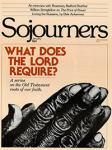The main office of Riggs National Bank is located just one short block from the White House and right across the street from the Department of Treasury. Riggs prides itself on being Washington, D.C.'s largest bank and one of the biggest worldwide. A mid-1980s advertising campaign of theirs boasted as much and more. The ads ran in the airport, on the subway and buses, in newspapers, and on the radio and television. They were hard to miss.
The first time I saw one I was riding the subway back to the office from downtown. I usually don't notice the ads on the subway, but this one was so different, so astonishing, that it fully captivated me. I was not surprised to see Riggs National Bank making an appeal to the many lawyers, lobbyists, political aides, and bureaucrats riding the subway. What struck me most was the way the appeal was made. Alongside a drawing of the bank was the following jingle:
The most important bank in the most important city in the world thinks you're important too.
I was startled. The ad disturbed and disquieted me. At first I was rankled by the genteel arrogance and pretentious pride of the rich and the powerful, flaunting their might before an entire city: the most important bank in the most important city in the world.
But I felt something more, something stirring discontent deep within me, playing upon insecurity and desire. It tried to lure me into its game, to play by its rules; it tried to seduce me into believing that I am valued for the dollar I make and the power I possess: You're important too.
As I became even more aware of my feelings, I sensed that something beyond the ad's haughty pride and seductive power was also disconcerting to me. I soon realized that the message of the ad implied contempt for the poor, who possess neither the wealth nor the power that Riggs prizes so highly. It was almost as if the ad was saying to the poor, with subdued disdain: you're not important.
The previous Saturday morning I was helping out at our food distribution center. With unemployment in our neighborhood running upwards of 50 percent, the need was very great. About halfway through the morning, one of the neighborhood women who helped distribute the food noticed a new person coming through the line. The man seemed unusually quiet and withdrawn, so Ella asked him if anything was wrong.
With obvious shame on his face and despair in his voice, he told us that he had lost his job the week before and that this was the first time he had ever needed to come "begging" for food. He said he hoped it would be the last time, because he felt very ashamed and angry that he could not support himself and his family.
As I sat in the subway reading that ad, I couldn't help but think of that man's painful shame and Riggs' subtle scorn. Later on I would see the Riggs ad as only a muted version of then-presidential counselor Edwin Meese's caustic contempt when he claimed that hunger in this country did not really exist, that people went through food lines only "because the food is free and ... that's easier than paying for it."
When Jesus told the parable of Lazarus and the rich man, the word he used to describe Lazarus (variously translated as "beggar," "poor," or "despised poor"), carried the visual connotation of "being spat upon." The image is still appropriate today. For whenever the Riggs Banks and the Edwin Meeses make their haughty claims, they have just as surely "spat upon" the face of every person in that food line, everyone who is poor in this country today. Confronted with a regular outpouring of scorn and derision, the poor have reason to cry out with the psalmist:
Have mercy upon us, O Lord, have mercy upon us, for we have had more than enough of contempt.
Too long our soul has been sated with the scorn of those who are at ease, the contempt of the proud.
—Psalm 123:3-4
As I left the subway and headed for the office, I knew that somehow God's mercy would be upon that man who lost his job and all those who suffer under "the scorn of those who are at ease." It gave me hope to know that they and I can trust in the God whose love for the poor is so much stronger than the contempt of the proud. With the words of the Magnificat we can give thanks:
He has put down the mighty from their thrones, and exalted those of low degree; he has filled the hungry with good things, and the rich he has sent empty away.
—Luke 1:52-53
Joe Roos was publisher and managing editor of Sojourners when this article appeared. In 2004 and 2005 Riggs was fined for money laundering on behalf of the Saudi Arabian embassy, former U.S.-backed Chilean dictator Augusto Pinochet, and others. In February 2005 a Spanish lawsuit forced Riggs to pay $8 million to a fund for Pinochet’s victims.

Got something to say about what you're reading? We value your feedback!
